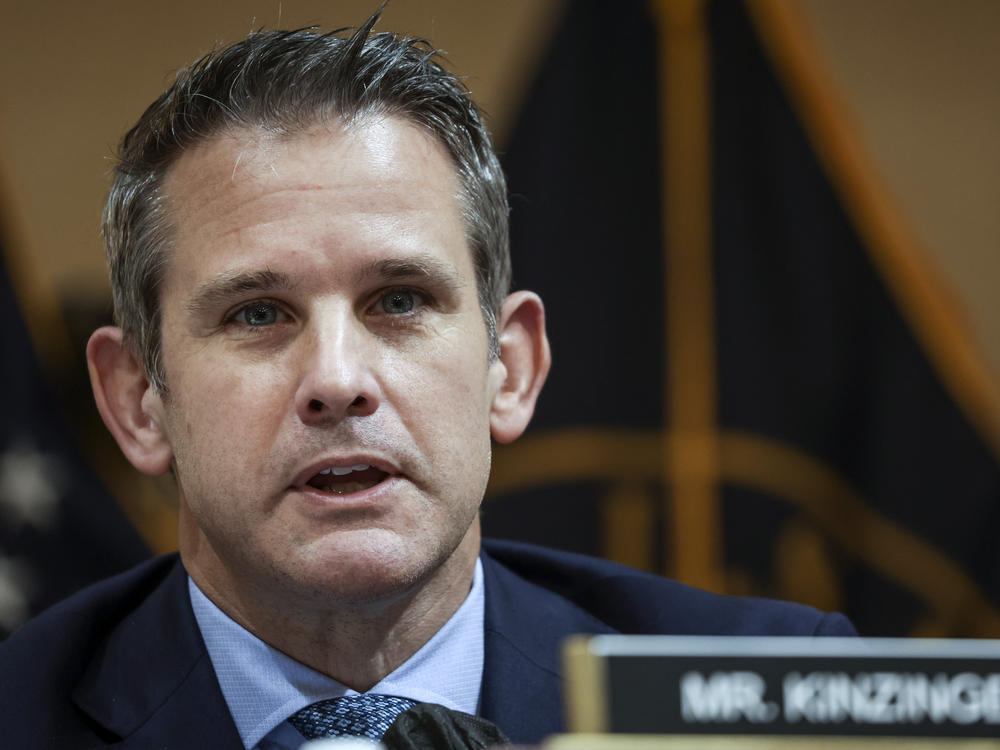Section Branding
Header Content
He says he's a moderate Republican, and the party is on a 'slide to authoritarianism'
Primary Content
Adam Kinzinger describes himself as a Republican moderate; something he says is a dying breed in American politics.
Who is he? A former Illinois congressman, Kinzinger served from 2011 until finishing his term at the beginning of this year.
- He is well known for his opposition to parts of his own party in the later years of his political career — especially in the wake of the Jan. 6 attacks on the Capitol.
- Kinzinger and former Wyoming Republican Congresswoman Liz Cheney were the only two Republicans to serve on the House Select Committee to Investigate the January 6th Attack.
- He was also one of 10 House Republicans who voted to impeach former President Donald Trump in 2021, and later announced that he would not seek reelection
What's the big deal? Kinzinger expands on these feelings of dissent in his new book Renegade — a reflection on his work, life and political career.
- In it, he details his perspective of what he says is a broken political system, the grueling nature of working as a politician, and his increased disillusionment with the Republican Party in the wake of Trump's presidency and subsequent impeachment trials.
What's he saying? Kinzinger spoke with All Things Considered host Scott Detrow about his career, the state of his party and what the future might hold.
On the type of people seeking office these days:
People are getting elected as a way to become famous. This is the new Hollywood, so to speak. But the problem isn't that they're not there to govern. The problem is the ones that are there to govern are not fighting back.
And a lot of the time they just put their head in the sand and pretend like we can get this fixed by just allowing the far right to have their way on a number of things. And so while most may be there to govern, that doesn't mean that they're going to actually do what they need to do to get to a situation where they can fight back and govern.
Want more on the House speaker? Listen to Consider This explore the career of Mike Johnson.
On former House Speaker Kevin McCarthy's ousting:
I think that writing was on the wall. I don't know if I expected it to happen this quickly, or maybe even went longer than I expected.
But when you cut a deal with what I think [former speaker John] Boehner aptly called the "terrorist caucus" and you start cutting deals that make it where they hold you hostage, and then you come up against real deadlines like a debt limit, like government shutdowns, I think it was inevitable.
So I guess I was surprised that the vote for McCarthy went into like a million rounds. But yeah, I was not surprised he was ousted. And frankly, I think it couldn't happen to a nicer guy.
On the difficulty of the job and the concept of "selling your soul:"
Look, I don't think it's worth it if you're going to sell your soul, because not only is selling your soul miserable, but the process of selling your soul in this is miserable.
And I don't know why you do it, except that there is an identity. Being a member of Congress is a powerful feeling. You're the center of attention anywhere you walk into except the White House.
And I think that's addictive to people. But I will say to anybody out there considering running, public service is still very honorable. And we need good people in public service to change this view.
But what we need are people that understand that your job isn't just to go stick your finger in the wind and figure out which way it's blowing. Your job is to actually go defend the Constitution of the United States, which is why we take an oath to it. And I think if we get more people like that in politics, I think the job would be worth it. And frankly, the job would be honorable again.
On whether he still considers himself a Republican:
I do, only because I'm not willing to give up and only because I haven't changed. I will say I will call myself a Republican that feels politically homeless at the moment and don't know where I belong.
But I also know that if everything kind of tracks the way it is in 2024, I won't be voting Republican because, again, I think it's a simple question of democracy or no democracy. And the Republican Party represents right now a real slide to authoritarianism ... If it was Joe Biden and Donald Trump, I don't think there's any question I would vote for Joe Biden.
So, what now?
- Kinzinger is unsure if he's out of politics for good.
- "You know, if you asked me this six months ago, I may have kind of hedged and said possibly, but I was exhausted. I'm coming to grips with the toll that it really did take on my family. The death threats, the people threatening to kill my 6-month-old child, which just goes to show the depravity in people's hearts. But as I've kind of come to grips with it and time has gone on, yeah, I could see a possibility where I get involved again."
Learn more:
- Biden plans to step up government oversight of AI with new 'pressure tests'
- Former Vice President Mike Pence ends his presidential campaign
- Donald Trump is set to testify Nov. 6 in his New York civil fraud trial
Copyright 2023 NPR. To see more, visit https://www.npr.org.


